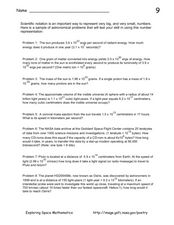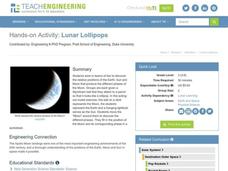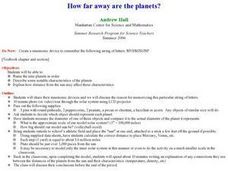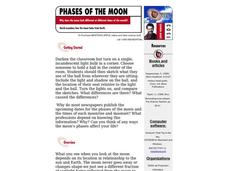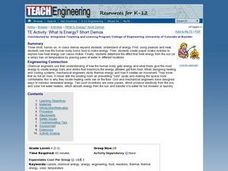Curated OER
Seeing Solar Storms in STEREO-I
In this geometric calculations of solar storms worksheet, students use a diagram indicating the location of 2 STEREO satellites, the earth and the sun to calculate the distance between a Coronal Mass Ejection and the Earth. They use...
Curated OER
An application of the Parallax Effect
For this parallax effect worksheet, students observe 2 photographs taken of an active area of the sun by 2 STEREO satellites and 1 photograph taken of the same active area of the sun by the SOHO satellite. Students observe the shift in...
Curated OER
Application of Scientific Notation
In this scientific notation worksheet, learners solve eight problems about the sun, the planets and the universe using very large numbers expressed in scientific notation.
Curated OER
Lunar Lollipops
Students work with a partner, Styrofoam ball and light source to simulate the positions of the Earth, Moon and Sun at various stages during the phases of the Moon. They describe why the Moon is visible from Earth and complete a worksheet.
Curated OER
How Far Away Are the Planets?
Students name nine planets in order, describe some notable characteristics of the planets, explain how distance from the sun may affect these characteristics, and create solar system models.
Curated OER
Seasons
Students investigate the reason for seasons on Earth during three activities. They construct a model of the Earth and Sun to identify patterns in the changes of the angle of light on the Earth's surface. Then they conduct a heat...
Curated OER
The Magic School Bus Gets Eaten
Students learn along with Ms. Frizzle's class. In this Magic School Bus lesson plan, students eat while they act as links in the food chain. Popcorn bags stand for food energy that is passed along the links in a food chain from the sun,...
Curated OER
Groups, Clusters and Individuals
In this galaxies, clusters and planets activity, students solve 5 problems including determining sunspot groups on the sun in a particular day, finding the number of individual galaxies present, determining the number of stars in...
Curated OER
Time Zone Math
In this algebra worksheet, students calculate the different time of the day that different countries see the sun. They convert between different time zones. There are 3 questions with an answer key.
Curated OER
The Last Total Solar Eclipse...Ever!
In this total solar eclipse worksheet, students solve 7 problems about the angular size of the moon, the distance the sun and moon should be to match in diameter, the number of years it will take for the moon to be at a certain distance...
Curated OER
The Solar Neighborhood within 17 Light Years!
For this distance between stars worksheet, learners plot the distance between the sun and 11 other stars on a 2 dimensional grid using a protractor and a ruler. They determine the distances between various stars and they find the...
Curated OER
Measuring the Speed of a Solar Tsunami!
In this solar tsunami worksheet, students are given three images of the progress of a Morton Wave on the sun. They solve six problems using the images to find the radius of the sun's disk, the scale of the image, and the time that passed...
Curated OER
Hinode Sees Mysterious Solar Micro-Flares
In this solar micro-flares worksheet, students read about the X-ray bright spots that the Hinode satellite's X-ray Telescope detected on the sun's surface. Students determine the scale of the image, the dimensions of the smallest bright...
Curated OER
Solar S’Mores
Learners use the energy of the sun to make s'mores. In this solar energy lesson, students gather the listed materials and follow the procedures to find out if they can make s'mores using solar energy.
Curated OER
The Reasons for the Season
Students explain the reason for the changes in season. In this lesson examining the relationship between the Earth and the Sun, students use an applet to discover how the alignment of the Earth and the Sun cause the change in seasons.
Curated OER
Phases of the Moon
Students explore why when you examine the moon depends on its location in relationship to the sun and Earth. The moon never goes away or changes shape-we just see a different fraction of sunlight being reflected from the moon to Earth.
Curated OER
SUNSPOTS SPOTTED
Students study sunspots and their motion, from data gathered, they determine the significance of the sunspot data. The data be used to calculate the rotational period of the sun. They draw conclusions as to the sunspot's impact on the...
Curated OER
Reasons for Seasons
Students model the tilt of the Earth as it orbits the Sun. They explain the meaning and characteristics of solstices and equinoxes. They explain that sunlight hits the Earth at different angles at different locations over the course of...
Curated OER
The Sky Jeopardy
First graders reinforce concepts about sun, moon, day, night and sky by playing the Sky Jeopardy game. In the end, 1st graders get to nibble crackers in order to show the different phases of the moon.
Curated OER
What Is Energy? Short Demos
Learners engage in three short, hands-on, in-class demos which expand students' understand of energy. First, using peanuts and heat, learners see how the human body burns food to make energy. Then, they create paper snake mobiles to...
Curated OER
Me and My Shadow
Students apply the process of scientific inquiries or technological design to explore the explanations of the daily patterns of the Earth's rotation. They record different shadow lengths showing the apparent movement of the sun through...
Alabama Learning Exchange
Stars
Fourth graders examine the life cycle of a star while listening to Roy Gallent's, When the Sun Dies. They conduct Internet research and recreate a star's life cycle after viewing an animation.
Curated OER
Summer Bummers
Brainstorm popular summer activities and their risks after having your class read an article. They will discover the risks of sun overexposure and in groups develop public service announcements for young people. They also propose a media...
Curated OER
The Seasons
Discover the change of the seasons by modeling the Earth-Sun system. Learners model the orbit of the Earth around the sun and explore how and why the patterns of winter and summer occur.
Other popular searches
- A Raisin in the Sun
- The Sun
- Sun and Moon
- Earth Moon Sun System
- Sun and Planets
- Sun Safety
- Sun and Stars
- Myths of the Sun
- Acrostic Poem About Sun
- Raisin in the Sun
- Characteristics of the Sun
- Sun and Earth




